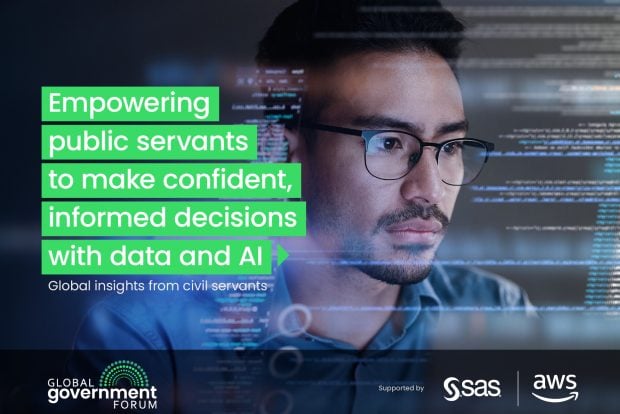GGF report highlights untapped potential of data and AI in government decision-making

New research from Global Government Forum has revealed that while eight in 10 civil servants agree that better use of data would help to achieve a range of outcomes in their organisations, there is some way to go before the majority have access to the data they need and can use it consistently to inform decisions.
The survey of over 600 civil and public servants worldwide also found that while the vast majority of respondents (81%) see either some or great potential in using artificial intelligence to improve decision-making in government, the more advanced capabilities of AI tools remain largely untapped.
These findings are published in the report Empowering public servants to make confident, informed decisions with data and AI.
The report – which also includes exclusive insights from senior civil servants and experts at knowledge partners SAS and AWS – determines the extent to which civil servants are using data in their work; identifies the obstacles blocking data-driven decision-making; and outlines what needs to be done to enable more comprehensive use of data and AI in government.
It sets out the potential of data and AI to meet the crucial government mission of boosting efficiency and productivity at a time of increasing demands, and includes examples and use cases from the UK, Ireland, Australia, Canada, Singapore, the US, and Nigeria.
Download the report: Empowering public servants to make confident, informed decisions with data and AI
Benefits and barriers
The benefits of data for decision-making are clearly understood by civil and public servants, with between 80% and 90% of survey respondents either agreeing or strongly agreeing that better use of data in decision-making is useful for achieving key outcomes in their organisations.
These include supporting more effective service design and delivery, improving the efficiency and productivity of teams, enhancing transparency and public accountability, and supporting innovation in policy or operations.
As Jennifer Robinson, global public sector strategic advisor at SAS, emphasised in the report: “I’ve heard government officials say, ‘I feel we should do this’, and they’re saying that because their gut is telling them. Others will say, ‘I think this’, because they have a little bit of information but not enough to have total confidence.
“What you want officials to be able to say is, ‘I know we should do this’ – because the power to know is afforded by their data and having the right information at the right time.”
Yet there are barriers to overcome before using data to make confident decisions is widespread.
The survey finds that while 38% of public servants use data to inform all or most decisions, a slightly bigger proportion (39%) say that data is often used but not consistently across decisions, and that 17% use data occasionally or only for certain types of decisions.
It also highlights that less than a quarter (24%) of those surveyed always have access to the data they need to make decisions – the biggest segment, 41%, usually do, 25% sometimes do, and 8% rarely do.
Barriers to data-driven decision-making include siloed data and lack of integration across departments and systems (cited by 43% of survey respondents); difficulty accessing relevant data (29%); insufficient investment in data tools, systems or roles (29%); and lack of skills to analyse and interpret data (27%).
Poor data quality and leaders that do not emphasise or model data-informed decision making were also cited as top barriers by a quarter of respondents (26% and 25% respectively).
Read more: AI agents and agentic AI: A leadership primer for government decision-makers
Getting the fundamentals right – and agentic AI
The report highlights the importance of laying the foundations for success – for example, through deploying tools and mechanisms that ensure high data quality, and adopting robust data governance frameworks to enable safe data sharing and instil public trust.
Improving public servants’ skills and data literacy, embedding a data-focused leadership and organisational culture, and building a business case for investment in data and AI are among other topics covered – along with a focus on AI.
The survey found that 81% of respondents see either some or great potential for AI to contribute to improved decision-making in government.
Examples in the report of how AI is being used to enhance decision-making and efficiency include: reviewing public consultation responses; analysing and managing vast amounts of geological, regulatory and community sentiment data; and enabling fast access to policy documents, guidelines and regulations.
Yet the study finds that more sophisticated types of AI are as yet little used, with great untapped potential for streamlining workflows.
Use of agentic AI, which can take successive actions autonomously and make decisions across a series of combined tasks, is explored in the survey. Almost three-quarters (73%) of respondents say they have either little or no awareness of agentic AI’s potential to support decision-making, and less than a third (27%) say their organisation is using agentic AI – 40% are not, and 33% don’t know.
The report highlights the opportunity for agentic AI and AI agents, and provides insights on how to manage data so that it is ripe for use by AI tools and systems.
During a webinar which also formed the basis of the report, Dr Sarah Garner, head of data and insight – One Login, at the UK Government Digital Service, Department for Science, Innovation and Technology, shared her vision for the future: “In five years I would like to see data being prioritised, data governance frameworks in place, and data having a seat at the table right at the top, with chief data officers and chief AI officers who are part of the conversation,” she said.






















